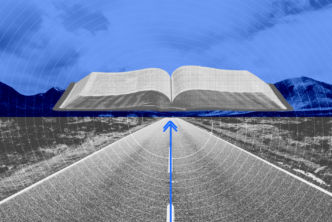Today’s guest post is by Prayson Daniel. Prayson, who blogs at With All I Am, has been using Faithlife Groups since 2012, and created the Natural Theology group. Prayson is from Tanzania, and he earned his BA at Harvest Bible College. He is currently pursuing his graduate studies at Aalborg University in Denmark. Prayson’s greatest desire is to inspire others to admire God through critical thinking.
There are moments in our lives when we encounter God’s silence. It happened to me in my late teens. As I went through a period of doubt and rebellion, God appeared to be as cold as ice and as far from me as the east is from the west. I doubted revealed theology. I rejected God. I wanted to be the captain of my own soul. As God used famine to bring the prodigal son back to his loving father, he used natural theology to restore the hunger and passion I once had in the presence of his majesty.
Revealed theology gave divine food to my heart and soul. Natural theology gave natural food to my mind. When my mind could finally join my heart and soul, my belief in the majesty and sovereignty of an infinitely gracious God was restored. His divine love now compels me to share the joy and delight I found in him through natural theology. He is now and forever my greatest treasure, outshining everything else.
God used natural theology to lead me back to him. That’s why I made the Natural Theology Faithlife Group. It’s a haven where we share Community Notes and discuss topics like the existence of God, the concept of God, and the nature and person of Christ. We explore concepts like how Christ can be understood to be both a human and a divine being, or the coherence of the Trinity—how God can be three separate persons yet one divine being.

So what is natural theology?
Natural theology pursues that which can be known about God through our natural human capacity. Unlike revealed theology—God’s self-revelation in divinely-inspired Scripture—natural theology explores what God has revealed in the natural world.
Thomas Aquinas, often considered the champion of natural theology, richly stated, “The existence of God and other like truths about God, which can be known by natural reason, are not articles of faith, but are preambles to the articles; for faith presupposes natural knowledge, even as grace presupposes nature and perfection the perfectible” (Summa Theologica).
In line with Aquinas’ distinction between “truths of reason” and “truths of revelation,” John Macquarrie explained that some knowledge of God is “accessible to all rational beings without recourse to any special or supposedly supernatural revelation.” Toward the end of the eighteenth century, the term “natural theology” was replaced by what is today known as “philosophy of religion.”
While notable Christian philosophers and theologians such as Aquinas, Scotus, Calvin, Descartes, and Locke, endorsed and advocated for natural theology, Hume, Kant and Barth adamantly opposed natural theology because it was based on the limits of human understanding.
Karl Barth argued that the noetic effect of sin makes it impossible for mankind to have any knowledge of God through pure reason alone and apart from grace in Christ Jesus. For Barth, there was no such thing as “truths of reason.” Rebellious humans “encounter [God] either at the place where God deals with us as Lord and Savior, or not at all.” He warned Christians not to occupy themselves with natural theology (Barth’s Church Dogmatics).
Are these critics of natural theology correct? Is natural theology useless?
Though I respect Kant, Hume, and Barth, I disagree with them here. It is true that natural theology by itself is insufficient to lead fallen mankind to the God revealed in Scripture, but that was not its intended purpose in the first place.
In his letter to the church in Rome, Paul stated that God’s “invisible attributes, namely, his eternal power and divine nature, have been clearly perceived, ever since the creation of the world, in the things that have been made” (Romans 1:20). God revealed himself not only in the natural world, but also deep within us. According to Paul, even without the Torah, Gentiles still know what the law requires because God has imprinted it on their hearts (Romans 2:12–15). It is in this sense that nobody is excused. John Calvin states:
“All men of sound judgment will therefore hold, that a sense of Deity is indelibly engraven on the human heart. And that this belief is naturally engendered in all, and thoroughly fixed as it were in our very bones, is strikingly attested by the contumacy of the wicked, who, though they struggle furiously, are unable to extricate themselves from the fear of God.” —Institutes of the Christian Religion
Barth could not dismiss the truth of this cornerstone passage for natural theology. He admitted, “It is unquestionable that knowledge of God is here ascribed to man in the cosmos, and Knowability is ascribed to God.” Neither Hume nor Kant was completely divorced from natural theology. The aesthetic escalation of beauty and the wonderful scenes in nature conveyed to Hume the truth of a supreme intelligence, and the rationale of moral behavior led Kant with pure reason alone to hold the nature and existence of God.
Revealed theology is the most perfect, infallible, and supreme way of acquiring knowledge about God, but as Thomas Reid wisely stated, it “was not intended to supersede, but to aid the use of our natural faculties.” The noetic effects of sin have left mankind unable to gain knowledge of God as Lord and Savior.
“God, however,” correctly noted John of Damascus, “did not leave us in absolute ignorance. For the knowledge of God’s existence has been implanted by him in all by nature.”
* * *





